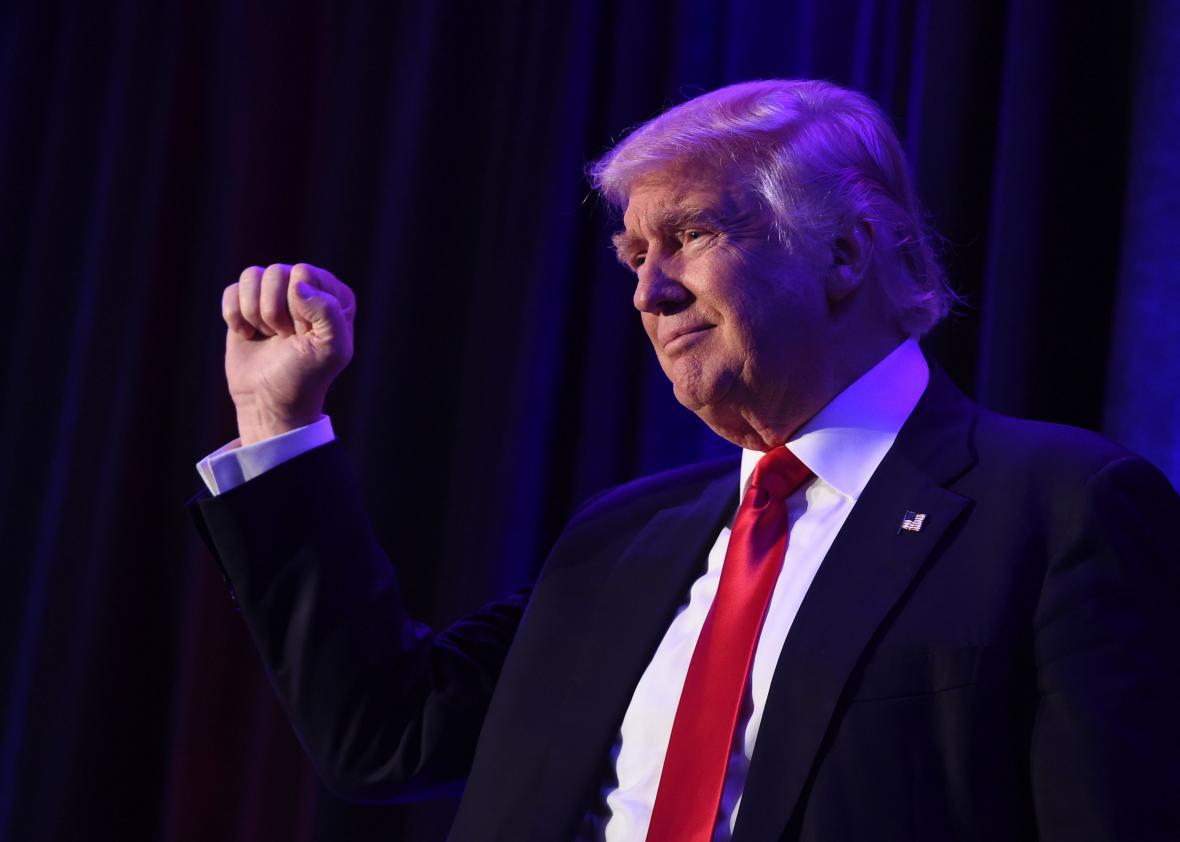President-elect Donald Trump’s foundation admitted in an IRS tax filing to violating laws against charity leaders profiting off of their own charities, the Washington Post reported on Tuesday.
It is further vindication for David Fahrenthold’s extensive reporting on the various abuses of the Trump Foundation. During the campaign, a Trump surrogate repeatedly attempted to portray Fahrenthold as a partisan hack and a liar, while denying the wrongdoing that the Post reporter had flagged.
The new filing, which the Post reports was posted on the nonprofit-tracking site GuideStar and uploaded by the Trump Foundation’s law firm, Morgan, Lewis and Bockius, offers further evidence for many of Fahrenthold’s allegations of self-dealing by the Trump Foundation.
Among the revelations in the report:
- The foundation checked “yes” when asked if it had transferred “income or assets to a disqualified person,” e.g., Trump, his family, or his businesses.
- The foundation checked “yes” when asked if it had previously engaged in acts of self-dealing.
- The foundation admitted to owning a Tim Tebow football helmet and two portraits of Donald Trump that it had paid for with charitable contributions.
- The foundation reported a $150,000 gift from the foundation of a powerful Ukrainian steel magnate, Viktor Pinchuk, who had also donated to Hillary Clinton’s foundation. This had helped raise conflict of interest questions for Clinton that Trump exploited on the campaign trail.
- Pinchuk, who supports stronger ties between Ukraine and the West, told the Post through a spokesman that this money was given as part of an agreement for Trump to speak at a conference organized by the steel magnate. This happened in September 2015, while Trump was running for president.
- The foundation took in $781,000 and gave away $896,000 in grants during 2015 and ended the year with $1.1 million in the bank.
- The foundation gave money to several conservative nonprofits, including $10,000 to right-wing stunt journalism provocateur James O’Keefe.
In the document, which the Post hadn’t been able to verify had been set to the IRS, the Trump Foundation admits to violating the ban on self-dealing in previous years. However, as the Post notes, the foundation hadn’t put that in its forms in previous years.
This raised questions about why those previous disclosures, signed by Trump himself, had not been accurate.
“What transactions led to the self-dealing that they’re admitting to? Why weren’t they able to recognize them in prior years,” Philip Hackney, who formerly worked in the IRS chief counsel’s office, said to the Post.
Typical penalties for the violations described include excise taxes and repaying of charity money spent to the the charitable leader’s benefit, the Post reported.
The Post had previously flagged several cases of apparent self-dealing. They included Trump’s $12,000 bid for a Tim Tebow–signed football helmet, which the foundation now admits it owns but which it hasn’t shared the whereabouts of. Another was for a 6-foot-tall portrait of Trump made by a “speed-painter” and bid on by his wife Melania for $20,000, which the foundation now admits it owns but which it hasn’t shared the whereabouts of. A third was a 4-foot-tall painting of Trump he bid on for $10,000, which the Post was able to locate on the wall of the sports bar at Trump’s Doral golf resort. At the time the Post reported this, Trump spokesman Boris Epshteyn claimed the restaurant was merely “storing” the art for the foundation, free of charge, a claim that the Post notes is laughable to IRS experts.
Other violations flagged by the Post included multiple cases where Trump used the foundation to pay charities as part of lawsuit settlements. One was for allegedly stiffing a winner of a Trump-sponsored hole-in-one golf tournament, the other was with the town of Palm Beach, Fla. over the size of a flag pole erected at Mar-a-Lago.
New York Attorney General Eric Schneiderman’s office is investigating Trump’s charity and its reported self-dealing.
Earlier this year as the Post raised concerns about the Trump Foundation’s self-dealing in the heat of the presidential campaign, Epshteyn was an outspoken critic of Fahrenthold.
“Well, he’s not really a reporter, he’s pretty much a Clinton surrogate at this point because he has no facts,” Epshteyn said. “He alleges things in his writings, but they’re always debunked.”
Epshteyn did not specify what facts Fahrenthold got wrong at the time. The Trump campaign did not respond to the Post’s request for comments on this latest story.
